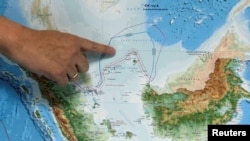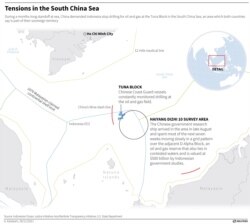China told Indonesia to stop drilling for oil and natural gas in maritime territory that both countries claim. The unusual demand is the latest in a series of disputes over natural resources between the two countries.
The Reuters news agency reported that four people who knew about the matter said the dispute over an area in the South China Sea grew tense for months earlier this year. The South China Sea is considered to be rich in resources and an important pathway to international shipping traffic.
One letter from Chinese diplomats to Indonesia's foreign ministry clearly told Indonesia to halt operations at a temporary ocean drilling structure. The letter said the drilling was taking place in Chinese territory.
Muhammad Farhan, an Indonesian lawmaker on parliament's national security committee, said he was informed about the letter. "Our reply was very firm, that we are not going to stop the drilling because it is our sovereign right," Farhan told Reuters.
A spokesman for Indonesia's foreign ministry said: "Any diplomatic communication between states is private in nature and its content cannot be shared."
China's embassy in Indonesia's capital Jakarta did not answer a request for comment.
Three other people, who said they were told about the matter, confirmed the letter. Two of those people said China made repeated demands that Indonesia stop drilling.
This year’s dispute took place in the Tuna Block area of the South China Sea.
Indonesia says the southern part of the South China Sea is its exclusive economic zone under the United Nations Convention on the Law of the Sea. It named the area the North Natuna Sea in 2017.
China’s claim in the South China Sea is marked by what is known as the nine-dash line on its maps. However, the Permanent Court of Arbitration in The Hague in 2016 found that China’s claimed boundary had no legal basis.
"It (the letter) was a bit threatening because it was the first effort of China's diplomats to push their nine-dash line agenda against our rights under the Law of the Sea," Farhan told Reuters.
China is Indonesia's biggest trade partner. It is also the country’s second-largest provider of investment.
Farhan said that China, in a separate letter, also protested against the mainly land-based military exercises with the U.S. in August. The exercises involved 4,500 troops from the United States and Indonesia. They have been held since 2009.
Tensions at sea
On June 30, the Indonesian Noble Clyde Boudreaux semi-submersible drilling structure, or rig, arrived at the Tuna Block in the Natuna Sea. It was to drill two test wells. Within days, a Chinese Coast Guard ship came and an Indonesian Coast Guard ship soon arrived.
China’s foreign ministry told Reuters that its ship was "carrying out normal patrol activities in waters under Chinese jurisdiction." It did not answer questions about communications with Indonesia over the drilling. China's defense ministry did not answer requests for comment. But, over the next four months, Chinese and Indonesian ships followed each other around the oil and gas field.
The Asia Maritime Transparency Initiative (AMTI) reported that a Chinese research ship, Haiyang Dizhi 10, arrived in the area in late August. It spent most of the next seven weeks in a disputed area known as the D-Alpha Block. Indonesian government studies value the resources there at $500 billion.
On September 25, the American aircraft carrier USS Ronald Reagan came within 13 kilometers of the Tuna Block drilling rig. And local fishermen said four Chinese warships were also deployed to the area.
Code of conduct talks restart
China is in negotiations with 10 Southeast Asian states, including Indonesia, on a code of conduct for the South China Sea. The talks are taking place through the Association of Southeast Asian Nations. The work restarted this year after being stopped because of the coronavirus health crisis.
China's increasingly aggressive activity in the South China Sea has concerned Indonesia. But Farhan told Reuters that its government did not want to discuss the recent tensions publicly. Leaders wanted to be "as silent as possible because, if it was leaked to any media, it would create a diplomatic incident," he said.
The temporary rig operated until November 19. After that time, it went to Malaysian waters. A spokesman for Britain’s Harbour Energy, the operator of the Tuna Block, said the drilling was completed on time. In a similar dispute with China in 2017, Vietnam gave up exploration activities.
Harbour Energy is expected to release an update on the drilling results on December 9.
I’m Mario Ritter, Jr.
Reuters reported this story. Mario Ritter Jr. adapted it for VOA Learning English. Hai Do was the editor.
___________________________________________________
Words in This Story
maritime –adj. of or relating to sailing on the sea or doing business (such as trading) by sea
sovereign –adj. having independent authority and the right to govern itself
submersible –adj. able to be used underwater
patrol –adj. activities meant to guard an area and make sure it is secure
jurisdiction –n. the power or right to make judgments about the law, to arrest and punish criminals
survey –v. to measure and examine (an area of land or sea)
reserve –n. a supply of something that is stored so that it can be used at a later time
code of conduct –n. a set of rules to guide behavior in a certain situation
We want to hear from you. Write to us in the Comments section, and visit our Facebook page.






